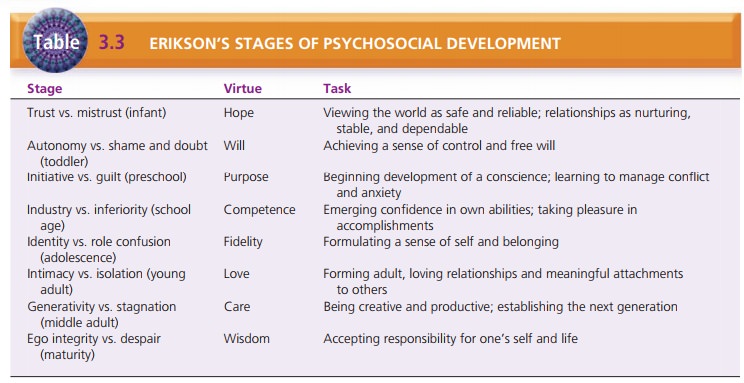Chapter: Psychiatric Mental Health Nursing : Psychosocial Theories and Therapy
Developmental Theories
Developmental Theories
Erik Erikson and Psychosocial Stages of Development
Erik Erikson (1902–1994) was a German-born psychoan-alyst who
extended Freud’s work on personality develop-ment across the life span while
focusing on social and psychological development in the life stages. In 1950,
Erikson published Childhood and Society,
in which he described eight psychosocial stages of development. In each stage,
the person must complete a life task that is essential to his or her well-being
and mental health. These tasks allow the person to achieve life’s virtues:
hope, pur-pose, fidelity, love, caring, and wisdom. The stages, life tasks, and
virtues are described in Table 3.3.
Erikson’s eight psychosocial stages of development are still used
in a variety of disciplines. In his view, psychoso-cial growth occurs in
sequential phases, and each stage is dependent on completion of the previous
stage and life task. For example, in the infant stage (birth to 18 months),
trust versus mistrust, the infant must learn to develop basic trust (the
positive outcome) such as that he or she will be fed and taken care of. The
formation of trust is essential: mistrust, the negative outcome of this stage,
will impair the person’s development throughout his or her life.

Jean Piaget and Cognitive Stages of Development
Jean Piaget (1896–1980) explored how intelligence and cognitive
functioning develop in children. He believed that human intelligence progresses
through a series of stages based on age, with the child at each successive
stage demonstrating a higher level of functioning than at previ-ous stages. In
his schema, Piaget strongly believed that biologic changes and maturation were
responsible for cog-nitive development.
Piaget’s four stages of cognitive development are as follows:
·
Sensorimotor—birth to 2 years: The child
develops a sense of self as separate
from the environment and theconcept of object permanence; that is, tangible
objects do not cease to exist just because they are out of sight. He or she
begins to form mental images.
·
Preoperational—2 to 6 years: The child
develops the ability to express self
with language, understands the meaning of symbolic gestures, and begins to
classify objects.
·
Concrete operations—6 to 12 years: The child
begins to apply logic to thinking,
understands spatiality and re-versibility, and is increasingly social and able
to apply rules; however, thinking is still concrete.
·
Formal operations—12 to 15 years and beyond:
The child learns to think and reason
in abstract terms, fur-ther develops logical thinking and reasoning, and
achieves cognitive maturity.
Piaget’s theory suggests that individuals reach cognitive maturity
by middle to late adolescence. Some critics of Piaget believe that cognitive
development is less rigid and more individualized than his theory suggests.
Piaget’s the-ory is useful when working with children. The nurse may better
understand what the child means if the nurse is aware of his or her level of
cognitive development. Also, teaching for children is often structured with
their cogni-tive development in mind.
Related Topics